- If an idea excites you, go with it.
- Be open to revision, and then be courageous and submit!
- Reach out, make friends, and support other writers.
By Prompt 32 in The Plot Whisperer Book of Writing Prompts: Easy Exercises to Get You Writing you are beginning to better understand your story. You also understand how many holes you've created and you often feel like you're floating without a net. By now, you also appreciate the discipline it takes to write a story with a plot from beginning to end.
Now you know or at least are beginning to suspect that the reason you procrastinate about writing has nothing to do with being blocked or not knowing what to write next. The daily prompts in PWBook of Prompts do that for you.
The reason you procrastinate is because you're afraid. You're afraid what you write isn't good enough or clever enough or witty enough. You worry you'll never capture the brilliance you see in your head and translate it to the page and, even if you do, you know it won't be perfect so why bother. Or this, you delight in your own writing and still, you resist, it all seems like such hard work.
Replace your belief in scarcity with the belief that so long as you sit down, read the next prompt, open yourself to inspiration and write your intended daily word count, you have enough, you are enough. You always have been. You always will be... enough.
SPECIAL EVENTS:
Book Giveaway: Next week, a couple of awesome websites are hosting a book give-away and party in celebration of The Plot Whisperer Book of Writing Prompts: Easy Exercises to Get You Writing release last month. Stay tuned for more information.
Plot Webinar: Join me virtually on March 6th to Track Your Plot at the Scene Level, webinar hosted by the Writers Store.
Knowing what to write where in a story with a plot allows for a more loving relationship with your writing. Whether writing a first draft or revising, if you falter wondering what comes next in a story with a plot, follow the prompts in The Plot Whisperer Book of Writing Prompts: Easy Exercises to Get You Writing.
Today, I write.
To familiarize yourself with the basic plot terms used here and in the PW Book of Prompts:
1) Watch the plot playlists on the Plot Whisperer Youtube channel.
2) Read The Plot Whisperer: Secrets of Story Structure Any Writer Can Master
3) Fill out the exercises in The Plot Whisperer Workbook: Step-by-Step Exercises to Help You Create Compelling Stories
4) Visit:
Blockbuster Plots for Writers
Plot Whisperer on Facebook
Plot Whisperer on Twitter
 It’s gone, my cherished writing space. Up until Christmas I worked at my laptop in the dining room. I used to have the whole of the dining table to spread out in, surrounded by a chaotic array of files, piles of paper, notebooks, post-its and an assortment of pens and pencils. But I’ve had to vacate the dining room while the kitchen and dining room are being knocked into one room with an extra three metres added on. I’m looking forward to the end. However, in the meantime, icy gales rush through, making a cup of tea requires me to negotiate an obstacle course. I need to wear several layers of fleeces inside the house to avoid frostbite, and I’ve had to stack my WIP and all the notes and various versions of the manuscript in one teetering, homeless tower.
It’s gone, my cherished writing space. Up until Christmas I worked at my laptop in the dining room. I used to have the whole of the dining table to spread out in, surrounded by a chaotic array of files, piles of paper, notebooks, post-its and an assortment of pens and pencils. But I’ve had to vacate the dining room while the kitchen and dining room are being knocked into one room with an extra three metres added on. I’m looking forward to the end. However, in the meantime, icy gales rush through, making a cup of tea requires me to negotiate an obstacle course. I need to wear several layers of fleeces inside the house to avoid frostbite, and I’ve had to stack my WIP and all the notes and various versions of the manuscript in one teetering, homeless tower. I’ve had a garden room built, completed just before Christmas, which will be my new working space. It’s sitting there gazing at me, (or maybe that's me gazing longingly at it!) To reach it, I would have to cross a ten foot ditch, a quagmire of mud, and fight off a plague of rats, and even if I made it there alive, there’s no space for me and my laptop and my tower of notes as it’s doubling as storage space for everything that was in the dining room and much of the kitchen that there’s no space for in the living room. I won't be able to get to it until April.
I’ve had a garden room built, completed just before Christmas, which will be my new working space. It’s sitting there gazing at me, (or maybe that's me gazing longingly at it!) To reach it, I would have to cross a ten foot ditch, a quagmire of mud, and fight off a plague of rats, and even if I made it there alive, there’s no space for me and my laptop and my tower of notes as it’s doubling as storage space for everything that was in the dining room and much of the kitchen that there’s no space for in the living room. I won't be able to get to it until April.
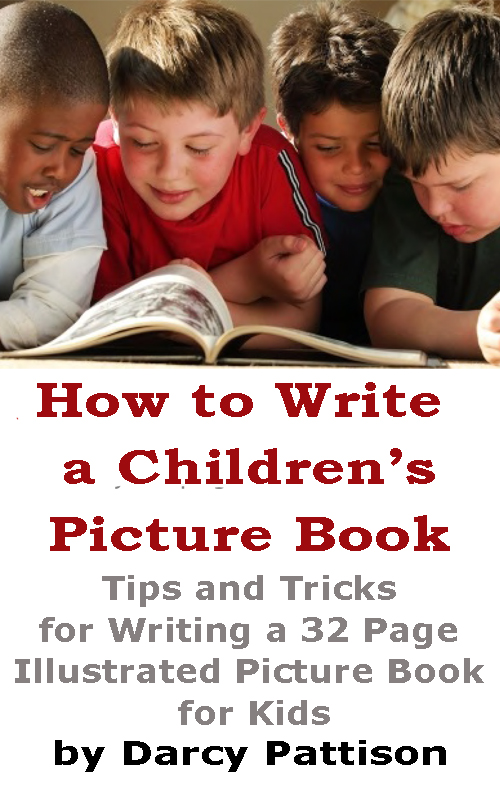 |
The process of revising your novel or story is a series of decisions and understanding the decision process can strengthen your revision process.
You get a letter from an editor that says something like this: “When Michelle is shot with an arrow, I wonder if she really needs to die. What if she avoids the arrow entirely?”
This frames the revision in terms of whether or not Michelle will be shot with an arrow and then die. That’s too narrow a context for a revision decision, and leaves out many alternate options. What if, she is shot in the leg and can’t walk; or, she is shot in the eye and can’t see; or, she is shot and runs a fever and recovers; or, she avoids the arrow, but Jillian is shot instead; or, (fill in the blank)__________.
Or, you may get a revision note that says the final chapter/climax scene doesn’t have enough excitement and needs more action. Maybe. But what if you revise it, concentrating on the mood the scene evokes, working to make it tense and emotion-filled? Maybe the problem is Mood, not amount of Action present.
When you are presented with only two options, don’t accept that narrow framing of the revision question. You don’t have to answer a “whether or not” question. Work to find other alternates. Editors don’t care HOW you make the story work, only that you do something that works.
You wonder whether or not your character should be red-headed. Narrowly framed questions like this look at the revision in isolated chunks and that’s not helpful. Instead, ask, “How will the character’s hair color influence the story? What if she were blond? Brunette? Red? Black? White?” You don’t just want to know the effect in a small section of the story, but across the whole novel. That’s giving yourself some real options that can lead to decisions that create a stronger revision.
Remove the current option. One trick to make sure you are asking more open-ended questions is to remove the current option; that forces you to take a wider look at your story and its context.
Ask: What if there was no archer, no arrow? What if Michelle never walked into that dark woods where the archer was hiding? What scene could replace this one?
Recognize: The final chapter/scene isn’t working–yet.
Ask: What options do I have to improve the storytelling here?
Multiple answers: Add action, revise for mood, create a totally new scene, keep the action the same but change the setting, keep the setting but change the action, create a different emotional context, and so on.

You’ve heard it suggested before: write ten openings to your story. Why do psychologists who study decision-making agree that this is good advice? Because multiple options create a real choice. (I am not talking about multi-tasking here, where you try to do 10 things at the same time; rather, you have multiple tracks ongoing, which gives you choices.)
For example, if you want to buy a house, you don’t just look at one house and make an offer. You would look at many houses, over an extended period of time. Or, to bring it back to publishing, when a book designer presents possible book covers, they don’t just do one cover with minor variations (do you want red or black type; should the typeface be 12pt or 16pt). Instead, they work to bring several totally different concepts to the table.
What do you think of this cover for The Lion, The Witch and the Wardrobe?

How does it compare to the other previous covers? Each has a distinct visual style. You want the same range of options when you revise.
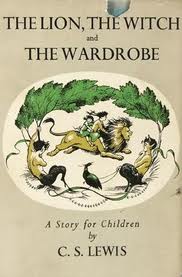


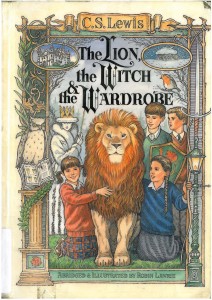
Researchers say it is much better to work simultaneously on several options, rather than to do them in sequence. In other words, write ten opening sentences and then choose where to go next. This is a stronger way of working than to write an opening sentence and follow it with an opening scene; then write a second opening sentence and alternate opening scene; repeat with a third. Working simultaneously on several options yields more creativity and does it faster.
When you create these options for yourself, beware of sham options, or of writing options that obviously will not work. Options that are too bold, the wrong tone, too clichéd, or otherwise obviously off the mark for this novel—these are not real options.
Which of these five would you say are sham options for an opening sentence for a Cinderella story? Which are real options?
When you are stuck on a revision decision, work to give yourself multiple real options. Don’t get stuck asking, should whether or not Michelle will get shot and die or not? Widen the context and find other options.
What if you really are stumped and the dreaded Writer’s Block is looming on the horizon?
First, look at your manuscript for Bright Spots. I know—in our zeal to revise and improve our mss, we focus so much on places where things are going wrong, that we forget to acknowledge the places where things are going right. This revision strategy asks you to look for Bright Spots, Golden Words (highlight these with yellow marker), Emotional Scenes that make the reader laugh or weep, Exciting Action, or any other place where the writing worked. Try to determine, what made it work?
What did you do well? Can you clone that success?
Approach a scene in the same way as before. What was your process for writing that scene? Repeat it for the scene where you are stuck. How did you create those emotions? Did you concentrate on reliving an emotional episode from your life? Did you mechanically go through and question every verb?
Look at your process, your inspiration, your word choices, the rhythm of the sentences—anything that worked before—and clone it.
If your own Bright Spots don’t help enough, then look for a Mentor Text, someone else’s writing that does what you want to do and try to clone that Bright Spot. Don’t worry about wholesale copying from someone else; you will add your own spin to it. You’re only looking to borrow a storytelling strategy.
Look first at stories similar to yours: if you write YA mystery, look to other YA mysteries. If you can’t find a Mentor Text there, though, don’t hesitate to look farther afield. Maybe a historical non-fiction uses some diary entries to create a sense of historical validity. Could you use fictional diary entries to do the same thing in your story?
Fill in this:
This revision problem is similar to ____________(title of mentor text). This book, solved a storytelling problem similar to mine by________________________.
In other word, you just used an analogy, comparing your storytelling problem to another book/story. If the Mentor Text used a first-person point-of-view, maybe that will work for your story, too. If the Mentor Text used a particularly effective description of the setting—even if the settings are vastly different—maybe that strategy will work in your story.
A variation of this would be to look at Best Practices of writing a novel. For example, Best Practices says that you should never add a flashback to the opening chapter. Oops! You did that. We read many books on how to write a novel, looking for these “best practices,” advice on how to write and revise better. And you would be foolish to ignore creative writing Best Practices. These are a sort of Playlist of Bright Spots.
However, you may also want to try doing the exact opposite of Best Practices. Nothing says it can’t work, it will just take more creativity to make it work.
When you revise a novel or story, you are making a series of decisions, important ones. Look at your decision-making processes to see if you can make smarter decisions and make them faster.
 |
Your novel is progressing nicely and you finish a chapter. But then, the next chapter is calling and you procrastinate, you read blogs, you do laundry, you AVOID.
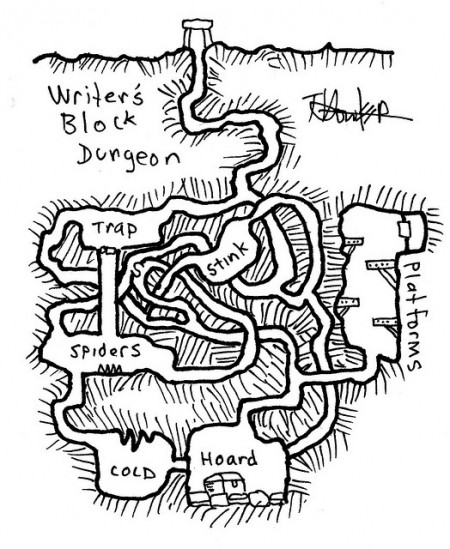 Sensory details. I like to imagine where my character is in the next chapter, then close my eyes, put myself there and try to imagine all the things the character might see, hear, touch, taste or smell. Then, I push hard to find an interesting detail and I start writing there. The danger is that you might start with too much description. That’s OK, you can take care of that during revision. The goal here is to get started.
Sensory details. I like to imagine where my character is in the next chapter, then close my eyes, put myself there and try to imagine all the things the character might see, hear, touch, taste or smell. Then, I push hard to find an interesting detail and I start writing there. The danger is that you might start with too much description. That’s OK, you can take care of that during revision. The goal here is to get started.
Action. Alternately, starting with a great verb can help jumpstart the story. Think beyond the usual: walk, run, turn head, whirl. Instead, go for something distinctive: salute, pirouette, regurgitate. (Please, avoid those pesky adverbs, which add so little. Not walked lazily. But strolled.) Get your character in motion and keep him/her in motion for a page or so, and you’ll figure out where to go next.
Dialogue. One of my favorite openings to a novel is Tom Sawyer, which opens with his aunt calling: “Tom!”
When in doubt, begin a new chapter with a bit of dialogue. Keep it going for about ten exchanges and then move on.
On the other hand, there are some dead-end ways to start chapters:
Waking up. Rarely does it work to have a character start a chapter in bed, then wake up. Boring. (OK. Prove me wrong! As long as it gets you going on a new chapter.)
Backstory. Long explanations of a character’s history rarely excite the reader either. We don’t need to know about Mary’s uncle’s horse and how it escaped and caused Mary to jump into a ditch where she broke her leg. Instead, show-don’t-tell how she is dealing with that broken leg. Past action is boring; current action is exciting.
Dull vocabulary. If there’s ever a place for brilliance of voice, phrasing, interesting vocabulary, it’s the opening of a chapter. Here is where you want to catch a reader’s attention. No, you don’t want it to be so overblown that it is out of character with the rest of the story; however, you do want it to catch a reader. And, the beauty is that if you do overwrite, it’s just a first draft.
These are ideas to help you get something—anything—on paper. There’s plenty of time for revision. But that first draft has to get written, one chapter at a time. Stop procrastinating. Write!
By Julie Daines
So, I've written three complete novels. One to be published late next year.
I just finished my third a week or two ago.
And now, as I stare at a blank Scrivener document, I can't remember how to write something new.
Oh sure, I have lots of stories percolating in my brain. I don't have writer's block per se.
I just can't remember how to get the ball rolling.
So I need your advice.
What are your tips and trade secrets to spewing out that first draft? Do you outline? Do you wing it? Do you write without chapter divisions? Do you write in scenes? Where do you go to generate plot ideas? What is your one, fail-proof step that helps you get the story flowing?
Please feel free to elaborate!
Even in the heat of summer, when the pavement sizzles and the sidewalk buckles, a writer can feel like she’s trying to break through the ice to find the words to tell her story. At times it can feel as if our words are trapped beneath the surface, frozen like fish caught in the ice while swimming upstream, irretrievable until the next thaw. How can a writer break the ice? Some days I
I am a freelance writer in Fayetteville, Arkansas. I’ve written for clients from Germany to California, all across the United States and in some small towns.
I’m also a freelance writer who doesn’t believe in writer’s block.
More specifically, I don’t believe in that mythical, wraithlike ogre that sucks the life and soul from a writer, rendering him impotent, unable to put words down on paper or screen. Yes, I still have challenges; I just don’t believe that true writer’s block exists.
The reason is simple: I can talk.
After all, writing is nothing more – and nothing less – than the written record of a conversation, whether it’s a speech or a dialog, spoken or unspoken. If you can talk, you can write.
I believe that what some folks call writer’s block is simply the result of a lack of confidence or a lack of motivation. Here are seven proven tips I use to get into the “write” mood.
1. If You’re a Writer, Call Yourself a Writer
Go back right now and reread the first paragraph of this post. Go ahead, I’ll wait for you.
Ah, you’re back. Did you see the answer to the confidence problem? It’s in the first five words of the very first sentence: I am a freelance writer. A ton of material has been written about speaking things into existence. It’s powerful. The concept of visualization is often used in sports to improve athletic skills.
Writers are no different. If you’re going to be a writer, then call yourself a writer. Go ahead, say it out loud: I am a freelance writer!
New writers start out excited about making a living with their words. However, doubt sets in and confidence wanes, smashing their dreams to pieces.
I know. This is one hurdle I had to clear myself.
Start calling yourself a writer at every opportunity. Get some business cards that say so. When people ask you what you do, tell them you’re a writer. Hey, they won’t laugh; they’ll believe you. In fact, they’ll probably ask what you write. If you still have job, mention it last, if at all. The more you call yourself a writer, the easier it gets.
And you’ll begin believing it as well!
2. Start by Writing Something Fun
Sometimes you’ll get up and tell yourself that you don’t feel like writing. What you probably mean is that you aren’t ready to get started on your paid writing gigs. No problem; start by writing something fun!
I’d recommend that every new writer start a blog on something they enjoy. I have blogs on gardening and computers, two of my passions. I get up every Monday morning, go out to the garden, take some veggie photos and then usually write a blog post. This gets my creative juices flowing, and viola:
I’m in the mood for words,
simply because they’re near me!
Funny, but when they’re near me,
I’m in the mood for words.
(Sorry about that; I’m an old song buff too.)
Sometimes, I’ll get really sneaky. I pull up several documents that need written, and then I’ll open up my browser in front of them. I write the blog post and when I close the browser the articles are there, waiting for me.
For new writers, there’s an added benefit in having a blog. I post on my one or the other of my blogs once a week. That comes out to 52 articles a year. If you don’t have clips yet, use these posts. In fact, the back of my business card says this:
Take a break and visit these sites for some of Steve’s writing samples.
The computer site and gardening site addresses are listed so the reader can go there and check out
Add a Comment
 Perhaps it is because we spend so much time living our characters' lives, feeling their joys and sorrows and getting angry or sad for them. We journey through their roads of despair and frustration when we make things go wrong in their lives - as they always must, or there would be no story to tell.
Perhaps it is because we spend so much time living our characters' lives, feeling their joys and sorrows and getting angry or sad for them. We journey through their roads of despair and frustration when we make things go wrong in their lives - as they always must, or there would be no story to tell.
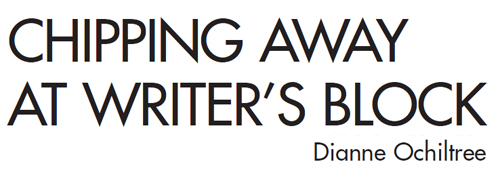 I admit it. This winter, I worked my way
I admit it. This winter, I worked my way
Because writers slide into a creative block one day at a time, so must we dig our way out of it, stepby-step. Here are a few of the ways to chip away at writer’s block:
Inspirational bedtime reading. Choose whatever type of reading material is most inspiring to your own creative process: Newbery Award winners? Published works from authors whom you could learn a technique or two? An inspirational writing exercise book such as Julia Cameron’s The Artist’s Way or Natalie Goldberg’s Writing Down the Bones? Trust your instincts and choose the literary food you feel will best nourish your creativity.
Write daily journal pages or do brief writing exercises. Either of these activities will get your pen skating across the paper or your fingers dancing on the keyboard. Knowing that it’s ‘just for practice’ will help free up your words. It doesn’t matter what time of day you decide to stretch your creative muscles, as long as you do it faithfully.Writing something daily will help ease you back into your old work routine.
Go back to writing ideas down in a notebook. When I’m blocked and not writing manuscripts, I don’t write down ideas that pop into my head, either. I glumly think: What’s the use? and let them go. What a mistake! Don’t let discouragement feed your writer’s block. By writing down ideas, you encourage yourself to continue to think in full creative mode. Remind yourself as you make each entry that you’re merely experiencing a temporary glitch in your writing life, which will soon go away.When it does, you’ll be ready with plenty of ideas and inspirations.
Break down large writing projects into smaller blocks and do them in small pieces of time. While this is a useful strategy at any time in my creative life, I find this crucial when I’m having trouble getting started or maintaining momentum. For example, when made vulnerable by writer’s block, the mere thought of attacking that HUGE book manuscript or magazine article shuts me down. I find it easier to break down a story into smaller units and attack it that way. Somehow, writing in ‘baby steps’ helps me overcome any fear of failure and keeps me on task. Like sewing a quilt, each small piece builds on the other, taking shape over a course of days until voila, the blanket is done.
Although writing your manuscript ten minutes at a time may not be ideal, it is preferable to not writing it at all!
Stop being a perfectionist about when and how you can create. Most people imagine a writer communes with a Muse in peaceful seclusion, sitting in a comfy parlor with dozing cats at our feet and a cup of herbal tea in hand. Anyone who has actually written knows that this is a myth…at least for 99% of us!
But the idea is so appealing that when we’re weakened by writer’s block, we talk ourselves into believing that we really can’t produce prose or poetry unless all the planets in our creative universe are in perfect alignment.To prove to myself that this notion is nonsense, I challenge myself to write something—anything—under the worst circumstances possible: with a blaring television in the background, in my dentist’s waiting room, in the grocery store check-out line, between the wash and rinse cycle at the laundromat. Not everything written is usable, of course, but you’ll be surprised at how often these
Maybe you aren’t writing because that internal editor demands perfection.
Lower your standards.
I am running again, following the Couch 2 5K program and there are days when it is hard! (Every day!) Like Monday. My legs gave out after 15-16 minutes and I stopped long before my planned 30 minutes. Still. That was more than I was running 3 months ago. I was a success. That didn’t mean I gave up on my goal of 30 mintues. I did that today, this morning. My goal this morning was 30 minutes, or at least, more than I ran on Monday. At 26 minutes into it, I wanted to stop again. But, gee, only 4 minutes left. You can’t stop then. I finished the whole 30 minutes. I did it by lowering my standards temporarily (beat Monday’s measly 16 minutes), and allowing myself to fail. On the other hand, when the finish was in sight, I made sure I didn’t stop.

So, in a first draft, we lower our standards. It’s just a first draft, get something on paper! Later, you can clean it up, revise it, or throw it away. But get the story down!
Writer’s block? Lower your standards! (Shh! Temporarily.)
For humorous cartoons on Writer’s Block, see my Pinterest Writer’s Block Humor board. IF you have great cartoons on this, please send them my way!
 |
by Rudy Garcia
Writer's Block! You think you've got troubles because your deadline's only days away, or your second installment on that trilogy is fast approaching and you already got an advance on it? At least your writer's block won't go on your permanent public-school record, maybe lead to your school being put on the dummies list and shut down, or land your favorite teacher in the unemployment line!
Here's something most teachers dread hearing: "I can't think of anything to write about," says the little girl who weighs less than half my dog. "No tengo ideas, Maestro," says another six-year-old who looks like the couch slept on him, instead of the other way around.
Writer's block, you see, doesn't just afflict the published and the renowned; it even infiltrates our public schools. [Of course this excludes charter school kids because they're the strongest writers who are creamed out of the public schools.]
Anyway, this isn't a how-to for adults to cure their writer's block; see your literary physician for that. But here I'll share how I inoculated a class of 3rd graders from this affliction so they could face the annual cruel and unusual standardized CSAP test in 2011 in Colo.
I'd heard that an entire class of 4th graders had turned in mostly blank sheets on the standardized writing test the previous year. Why? Because it asked about something they'd never experienced. They could only imagine answering truthfully, which meant they had no prior knowledge to work from, nor anything to write about. For that, they should have received high marks in honesty, or something else that standardized tests don't measure.
So, at their teacher's invitation, I taught them some of my "author's secrets" to help avoid making the same mistake as the 4th graders. One "secret" I shared was that the standardized test nazis don't care about the truth, honesty or any other ethical concerns, other than the obvious non-charter school cheating. All they care about is the writing.
My instructions to the students were: Invent. Lie. Borrow. Filch. Fabricate anything to answer the prompt and write it as well as possible.
The "secrets" involved several lessons that I might reveal another time, but the end result was that these 3rd graders scored high marks on the CSAP. According to their regular teacher, it worked.
Later, some kids bragged about how much they'd invented, how many lies they'd told, and how far from reality their compositions were. Of course, I felt half-traitorous for "teaching to the test," in asking them to subvert their character for the sake of scoring high, and for telling a BIG LIE. But my soul is safe because I wasn't their regular teacher who feels guilty enough for both of us.
At the start of this year, I shared some of my "secrets" with my 1st graders. Then I had them write a narrative of "When I went to China." Almost every one of them qualifies for free lunch and the most they'll experience anything of China anytime soon is one of those $1 scoops at an Asian-sounding restaurant. But that didn't stop my 1st graders.
What did they write? "I went to China and saw my teacher Maestro Garcia."--Invention. "Me and my three friends went to China and had a good time using chopsticks and eating sushi."--Lies. "I went to China and met a friend who taught me Chinese and I taught her Spanish."--Total Fabrication.
Luckily, my 1st graders have two more years before they'll have to suffer the new Colo. standardized test. And unless their present teacher has some I-should-prepare-them paranoia for breakfast, they won't have to undergo this rigmarole very often.
Is there a lesson here for curing adult writer's block? I doubt it. But the next time your non-charter school kids tells you, "I can't think of anything to write for homework," toss your moral baggage in the trash can and repeat to him/her/it ten times: Invent
What do you do when you can’t get past a sticky point in your story? You know that it’s not working quite right, but you can’t pinpoint the problem: you’re in limbo.
 |
Add a Comment
By: Anji Sandage,
on 3/17/2012
Blog: Utah Children's Writers (Login to Add to MyJacketFlap) JacketFlap tags: writer's block, writing prompts, story starters, Add a tag
Pick one that speaks to you and get writing! Find more information about this book at www.freshboiledpeanuts.com
0 Comments on Weekend Writing Prompt as of 1/1/1900
Add a Comment
By: Anji Sandage,
on 3/3/2012
Blog: Utah Children's Writers (Login to Add to MyJacketFlap) JacketFlap tags: writer's block, writing prompts, story starter, Add a tag
3 Comments on Weekend Writing Prompt, last added: 3/4/2012
Display Comments
Add a Comment
Blog: SACRED DIRT (Login to Add to MyJacketFlap) JacketFlap tags: writers, play, writer's block, scribbles, freebies, crafty, good books, writing conference, kid play, crafty hows, SCBWI, writing advice, writing, Add a tag
 I'm at a blank! I know my plot, my scenes, my characters and their backstories to the nth generation. I have tidy rows of index cards in Scrivener spelling me all the way to the end. I know what NEEDS to happen next but I just can't picture WHERE it happens. On a ship? In a shack? (Sounds like something from Green Eggs and Ham) Outside? Moonlight? Storm clouds? Hammocks? Dock? Bridge? This is no end of frustrating! I recently read this advice from author Molly Blaisell about writing novels. One of the gems she writes is to Stop Rushing Yourself. So I'm playing with the kids. A fruit box puppet theater is a good way to try different settings for the novel...right? While a fruit box has a perfect open shape for marionette-style puppets, my kids wanted stick puppets. So I cut a hole big enough for four pairs of hands plus
4 Comments on When Words Fail, Make Puppets, last added: 1/28/2012
Display Comments
Add a Comment
Blog: The Clock Monkey (Login to Add to MyJacketFlap) JacketFlap tags: Writing, Writer's Block, Guest Post, Add a tag
Solutions to Writer's Block When you have a writer’s deadline,nothing is as frustrating as writer’s block. Whether the “victim” is a studentwho has a deadline for an assignment in graduate programs online,or whether it is a professional writer with an internal expectation to get acertain amount of work done, writer’s block is incredibly frustrating andintimidating for writers of all ages and experience levels. There are solutionsto get over writer’s block so that the blank page or computer screen stopstaring back and taunt them with their lack of progress. Be Prepared Sometimes writer’s block comes frombeing under-prepared to write about specific topics. This might mean having towrite about a topic they have little knowledge about and haven’t prepared for,or because the topic was assigned and the writer has little interest. If thisis the kind of preparation the writer lacks, then a solutionfor that problem is to research. Whether writing as a student or asa professional, gaining background information can be an integral part ofmaking the brain click so that the words will flow more readily. Another part of preparation is tothink about where the writing will go before you start. You can make an outlinebefore writing, or you might try brainstorming possible topics to include inthe writing. Some people can do this by talking through the story, even if thewriter is only speaking to herself. Many times getting those main ideas outthere, whether on paper or some other manner can lay out what needs to be doneso the writer may begin. Start in the Middle (or the end) Sometimes the issue for writers ishow to start, or even where to start. One solution is to start with what is known. Sometimes we know thatsomething important happened, b
Add a Comment
By: Emma Walton Hamilton,
on 10/24/2011
Blog: Emmasaries (Login to Add to MyJacketFlap) JacketFlap tags: Blog, writing, Jules Feiffer, writer's block, Billy Collins, writing inspiration, writing routines, Roger Rosenblatt, Julie Sheehan, MFA in Writing and Literature, Neil Gabler, Stony Brook Southampton, Add a tag
Another one of our faculty members, the biographer Neil Gabler, refers to what he calls “Gabler’s Law”: First, you just sit there. I love this, since I can come up with a thousand excuses as to why I can’t yet sit down to write – my favorites being, “I’m not ready,” “I don’t have an idea yet,” and “I’m still stewing.” Recently I’ve been experimenting with a law of my own: Just start. Since I’ve incorporated this law, an amazing pattern has begun to emerge with respect to these writing assignments. It generally goes like this: Day 1 – “OK, I’ve got the assignment for this week. It seems do-able.” Day 2 – “What was I thinking? This assignment is the hardest yet! Ack. I’ll think about it tomorrow.” Day 3: “I might have an idea. I’ll let it stew a bit.” Day 4: “It’s a terrible idea. Never mind. Help!” Day 4: “This is impossible. It’s actually out of the question. I don’t have a single idea!” Day 5: “This may be the week where I have to call in sick. Is there any valid excuse I can come up with for not doing the assignment this week? Day 6: “God, class is tomorrow. Just sit there and begin – something, anything!” Day 7: “What time is class?” What this has taught me is that I can afford to be patient while all those little gremlins in my head cycle through their strange but apparently necessary routine. But then, if I just sit there and START – just put my fingers to the keyboard and begin, something, anything – stuff begins to happen. It doesn’t matter where I start, just that I do. And of course it’s all about editing – but the miracle is, once I start, I have something to edit, and once I edit, I (usually) have something to present.
0 Comments on Just Start as of 1/1/1900
Add a Comment
Blog: Darcy Pattison's Revision Notes (Login to Add to MyJacketFlap) JacketFlap tags: discouragement, writing life, writer's block, writer's life, Art and Fear, Add a tag
Random Acts of Publicity DISCOUNT:
4 Ways to Battle DiscouragementWhen you are so very, very tired of yet another rejection, when discouragement threatens to overwhelm you, what do you do? Friends: One antidote is to stop writing and be with friends. Writer-friends are especially helpful because you can commiserate endlessly (read: complain) about how callous those horrible editors are, how short-sighted, how bad their taste in literature is not to recognize genius when they read YOUR mss. Second best is a DH, who’s been there through the worst of it with you and been there through the good (Thanks, D!) Mostly, you just need someone who love you and understands that these creative efforts are necessary for your well-being–even when you get rejection after rejection. Past Successes: Yes, you have past successes. You have finished a story, maybe even a whole novel. Don’t look right now at the fact that it needs a big overhaul; just look at what you’ve accomplished! 50,000 words in a month! 3 picture book manuscripts polished and sent out this year. You’ve taken solid, positive steps in the right direction. Your cup is half full, not half empty! Look! Get out of Town: This weekend, my DH and I went camping and hiking. Back to nature, where no words on a paper/computer screen make a difference. Here’s a couple shots from the Buffalo National River. One thing this does for me is remind me to look for small details. It fills my tank of sights, sounds, smells, textures, so I have something to put in my writing later. The shoe was at an old abandoned farmhouse. You may not like camping (silly you!), but sometimes you need a break, a change of scenery, a day off. Get out of town! Read Art and Fear Add a CommentBlog: Darcy Pattison's Revision Notes (Login to Add to MyJacketFlap) JacketFlap tags: writer's block, revise, novel, character, characters, plot, characterization, Add a tag
OK, so I have this revision to do and one key element of it is to deepen characterization and relationships. Uh, oh. My weakness! How did the editor know that it was my weak area? Even after spending agonizing hours on characterization, I’m still not hitting the mark. Which left me stumped on this revision. I’m not blocked. Just don’t know what to do next. Here’s my analogy. In China, we passed by open doorways that led to teensy courtyards from which four houses (or more) might front onto. We could look through the doorways, but the glimpse was brief, you didn’t get much detail.
That’s how I tend to write characters, from the outside looking in. But this week, I’ve been rephrasing the question. The answers can NOT change the plot, the actual actions of what is going on. I’m actually happy with the plot. Instead, I’m looking at the inner person, the relationship which is revealed by the plot events. Asking about relationship seems easier to me than asking about how to characterize. It’s interactive, as one character does something, the other must respond. If I can find a central thing around which I can center conflict and reveal character with that, it will work. In the current scene, the characters are discussing going somewhere and they both agree that they need to do that. Well, there is conflict in the plot, because it’s a daring thing they do. In the revision, though, I’m having Character A hesitate, wondering if she should consult her father or someone other adult before going. Meanwhile, Character B is impulsive and confident. “A” generally has a superior attitude to B, so she can’t let him get the upper hand by being so bold. And thus the relationship develops. Who will bluff the other into action? Who will compromise their ideals to prove to the other they are tough? It’s like zooming into that Chinese courtyard to see the small details. Suddenly, the relationship has revealed details of the character and we see clearly.
By: Victor Volkman,
on 7/8/2011
Blog: Authors Access - Where Authors Get Published and Published Authors Get Successful (Login to Add to MyJacketFlap) JacketFlap tags: Writer's Block, Tyler Tichelaar, Memoir, Writing, Add a tag
|
Dion McInnis has always loved the stories of his life and the lives of those he encountered. He believes in the richness, wisdom and humanity of stories. Over time, he realized that it is harder to rekindle memories and find the ways to turn them into stories, whether for memoirs, autobiographies, short stories and so on. So, he developed a way to find the memories and turn them into words. His most recent book is entitled Daddin’: The Verb of Being a Dad. |
|
|
Keep adding rejections till you get to 100 or more-- fold them in to the batter slowly but steadily (and don't get discouraged every time you add a rejection to the bowl... every rejection gets you one step closer to an acceptance-- and if you think rejections are a good thing, you'll keep submitting, which is the only way you can get published anyway! :o) )
P.S. Love this post, Sharon! Can't wait to see what ingredients everybody adds!
50 lbs. of patience and perseverance.
After baking, let cool for one month.
A heaping cup of imagination!
A heaping cup of imagination!
Great ingredients everyone! Now all we have to do is try and follow the recipe...